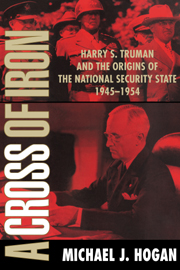Book contents
- Frontmatter
- Contents
- Preface and Acknowledgments
- 1 The National Security Discourse: Ideology, Political Culture, and State Making
- 2 Magna Charta: The National Security Act and the Specter of the Garrison State
- 3 The High Price of Peace: Guns-and-Butter Politics in the Early Cold War
- 4 The Time Tax: American Political Culture and the UMT Debate
- 5 “Chaos and Conflict and Carnage Confounded”: Budget Battles and Defense Reorganization
- 6 Preparing for Permanent War: Economy, Science, and Secrecy in the National Security State
- 7 Turning Point: NSC-68, the Korean War, and the National Security Response
- 8 Semiwar: The Korean War and Rearmament
- 9 The Iron Cross: Solvency, Security, and the Eisenhower Transition
- 10 Other Voices: The Public Sphere and the National Security Mentality
- 11 Conclusion
- Selected Bibliography
- Index
10 - Other Voices: The Public Sphere and the National Security Mentality
Published online by Cambridge University Press: 03 May 2010
- Frontmatter
- Contents
- Preface and Acknowledgments
- 1 The National Security Discourse: Ideology, Political Culture, and State Making
- 2 Magna Charta: The National Security Act and the Specter of the Garrison State
- 3 The High Price of Peace: Guns-and-Butter Politics in the Early Cold War
- 4 The Time Tax: American Political Culture and the UMT Debate
- 5 “Chaos and Conflict and Carnage Confounded”: Budget Battles and Defense Reorganization
- 6 Preparing for Permanent War: Economy, Science, and Secrecy in the National Security State
- 7 Turning Point: NSC-68, the Korean War, and the National Security Response
- 8 Semiwar: The Korean War and Rearmament
- 9 The Iron Cross: Solvency, Security, and the Eisenhower Transition
- 10 Other Voices: The Public Sphere and the National Security Mentality
- 11 Conclusion
- Selected Bibliography
- Index
Summary
The national security mentality reached well beyond the state makers in Washington. National security issues also engaged leaders in other areas of American life, not to mention ordinary citizens, many of whom found ways to register their convictions. This chapter tries to read how people other than policy makers reacted to the Cold War, and especially to the developments described in the preceding chapters. Its focus is on the public sphere rather than on Congress, the presidency, and other agencies in what might be called the political sphere, although this shift in focus does not involve a shift in themes. On the contrary, by moving from a state–centered narrative to one that is decentered, it is possible to determine if the views expressed in Washington reverberated in other quarters and thus to provide a fuller account of the postwar struggle to reshape the state and redefine the country's political identity.
As employed here, the public sphere embraced several groups, including journalists and commentators whose views have been traced in the previous chapters and need not detain us further. Instead, this chapter focuses on Cold War intellectuals and ordinary Americans. Although American intellectuals were not as active in shaping national security policy as they would be a decade later, the early Cold War did influence their thinking and contribute to a national security mentality that is evident in their published work and political activity.
- Type
- Chapter
- Information
- A Cross of IronHarry S. Truman and the Origins of the National Security State, 1945–1954, pp. 419 - 462Publisher: Cambridge University PressPrint publication year: 1998



